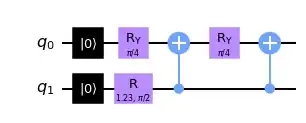By preparing $n$ qubits in $|0 \rangle ^{\otimes n}$ and then passing through the Hadamard gate, one can obtain a system superposition in $\{0,1 \}^n$, each state with equal probability.
I’m wondering if it’s possible to prepare the system in a state where some of the states $|i\rangle$ have a probability of zero.
And $i$ need not be constant in some digit.
Using two qubits as an example: input $|00 \rangle$, expecting $|\psi \rangle = \frac{1}{\sqrt{3}}(|10\rangle +|01\rangle+|00\rangle)$. Do there exists some gate doing this?
